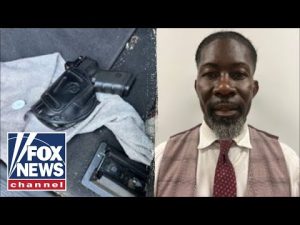In a backdrop filled with intrigue and controversial politics, the legal saga surrounding former FBI Director James Comey is heating up. On October 9th, a hearing is set to take place that will address serious allegations against Comey, who is known for his role in the infamous investigation dubbed Operation Crossfire Hurricane. George Papadopoulos, a foreign policy adviser during President Trump’s first term and a familiar face on conservative media, has been vocal about his thoughts on the matter. He’s no stranger to the consequences of Comey’s actions, having served time in prison as a result of the investigation before being pardoned by President Trump—a gesture he appreciates deeply.
For Papadopoulos, this trial represents more than just Comey facing accountability; it symbolizes a sense of personal vindication. He reflects on the impact of Comey’s purported lies and the broader implications for the millions of Americans who voted for Trump, who may have felt the tremors of this politically charged earthquake. His sentiment resonates with many in the conservative sphere who believe that the investigation was not just a hunt for the truth but a directed attack on the Trump administration and its supporters.
As the case progresses, the spotlight is on the prosecution and how formidable their case will be against the former FBI chief. Papadopoulos, while not a legal expert, expresses confidence that the evidence against Comey is robust. He points to moments captured on national television where Comey allegedly misled Senator Ted Cruz as pivotal to the prosecution’s argument. Such statements, if proven to be misleading—if not outright lies—could bolster claims that Comey abused his position for political ends.
Amidst the excitement surrounding Comey’s impending hearings, another eyebrow-raising revelation has emerged. Reports indicate that over 250 plainclothes FBI agents were deployed to the U.S. Capitol during the events of January 6th. To some, this raises questions about whether these agents were merely observers or if they were stirring the pot in the crowd. A quick glance at the situation evokes the notion that perhaps the FBI’s role on that day went beyond monitoring, and may have even involved instigating chaos. This specter of alleged misconduct shadowing the January 6th incidents only adds fuel to the fire of ongoing debates about governmental overreach and accountability.
However, with Judge Michael Nachmanoff presiding over Comey’s case, concerns about impartiality cannot be overlooked. As a Biden appointee, his role could significantly affect the proceedings, potentially skewing how evidence is assessed. Yet, Papadopoulos exudes a sense of hope that the case has been solidly built and will withstand scrutiny, regardless of the administration ties of the judge. Given the gravity of the charges against Comey, which are far from trivial, there remains a possibility that even a politically appointed judge cannot ignore the compelling evidence and the overwhelming public interest in justice being served.
Looking further down the rabbit hole, Papadopoulos hints at the digging of deeper graves for others connected to the scandal. Names like Hillary Clinton, Barack Obama, and John Brennan have been floated, suggesting that they may also find themselves in the crosshairs of investigations centered around this controversial chapter in American political history. As the clock ticks down to the October hearing and beyond, questions abound. Will justice truly be served, and who else might fall under the scrutiny of those seeking accountability? As the plot thickens, one thing is clear: the winding road of political drama in America is nowhere close to reaching its destination.







